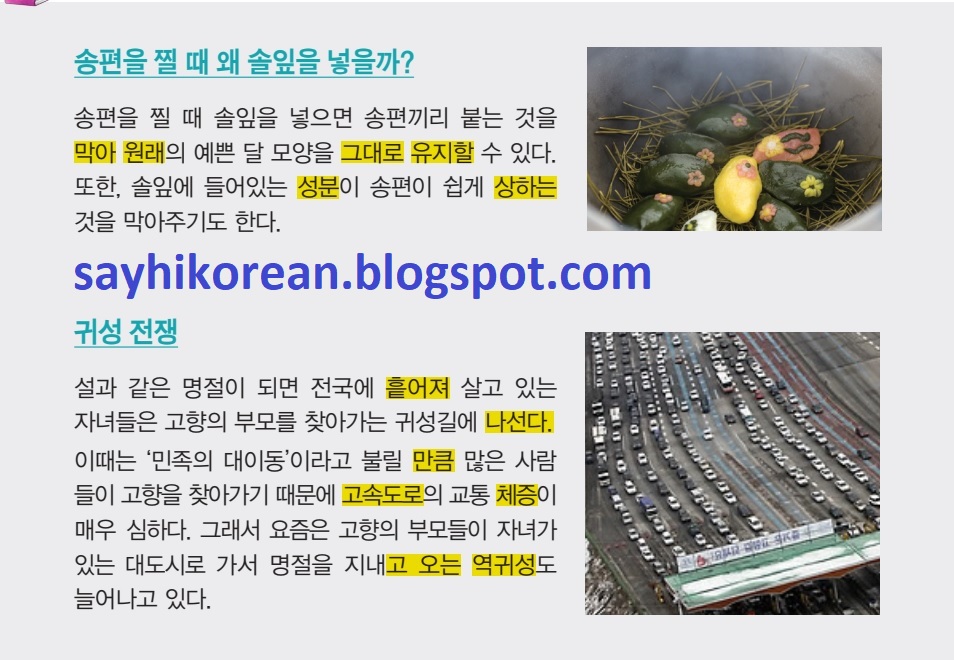Vocabulary:
해당하다: to correspond to; to be equivalent to; to be tantamount to
돌아가시다: to pass away
조상: ancestor
차례: ancestral rite: a memorial ceremony held during the day on Chuseok, Korean Thanksgiving Day, or Seollal, Lunar New Year’s Day, etc.
지내다: to live, to hold, to spend
절을 올리다: to make a deep bow
세배: new year’s bow (the act of performing a traditional bow to pay respect to one’s elders on Seol, New Year’s Day).
덕담: words of blessing; well-wishing remarks
세뱃돈: new year’s money (money received after new year’s bows).
입히다: to dress; to clothe
설빔: new clothes for the New Year (clothes or shoes newly bought for the New Year or worn on the New Year)
곱다: beautiful, pretty
화려하다: colorful; flashy; splendid
색동옷: rainbow-striped garment (clothes made by using lots of different colors).
장수: longevity
가래떡: Rice cake in round stick form, which is white, long, and thin.
납작하다: flat
썰다: to slice; to cut
산소: grave; tomb/ graveyard; burial ground
성묘: to visit one’s ancestral grave
친척: relative
윷놀이: playing yut; game of yut (a game in which players compete with pieces to reach the finish line first, as they throw a set of four yut sticks and move the pieces).
연날리기: kiteflying
제기차기: A traditional Korean game where players kick a jegi, a traditional Korean toy.

Vocabulary:
농사일: farm work
한가하다: leisurely; unhurried; relaxed
던지다: to throw
말판: A board with courses drawn on it, along which the mals, tokens, are moved, used in the traditional Korean board game called yunnori.
말: piece (a small object used in yunnori, a traditional Korean game, janggi, Korean chess, chess, etc., by carrying and moving it over the board to indicate the position according to the rules).
움직이다: to move; to budge; to be in motion
예측하다: to predict
흥미진진하다: exciting; adventurous
연날리기: kiteflying
대나무: bamboo
연: kite
띄우다: to fly; to let fly; to launch
연줄: kite string
끊다: to cut, to cut off
날리다: to fly, to blow
나쁜 운: bad luck
날아가다: to fly; to fly away
외치다: to cry out; to shout
이기다: to win; to beat; to defeat
곡식: to grain; to crop
섞다: to mix, to add
짓다: to make
묵다: to get old; get stale/ to stay; lodge
깨다: to break
부럼: nut (hard fruit such as peanuts, chestnuts, walnuts, etc., which one eats on January 15th of the lunar calendar by crunching on the nut in order to ward off all the evils for a year).
깨물다: to bite
튼튼하다: strong, healthy
<Page 68> SECTION 2: 더도 말고 덜도 말고 한가위만 같아라.
Vocabulary:
수확하다: harvest
시기 : time; period
풍성하다: abundant; plentiful; ample
햇곡식: new crops of grain
햇과일: newly harvested fruits
담다: dish up
차례를 지내다: to have a memorial ceremony for ancestors
성묘: to visit one’s ancestral grave
벌초하다: cut the weeds (around a grave)
묘지: grave; tomb; graveyard
풀을 베다: to cut grass
솔잎: pine needles
찌다: hấp
보름달: full moon
바라보다: to look; to stare; to gaze
소원: to wish; to hope
소원을 빌다: to make a wish
달맞이: moon greeting (an event of praying to the moon on a hill or in a field after waiting for the moon to come up in the evening of Daeboreum, First Full Moon Day, or Chuseok, Korean Thanksgiving Day)
강강술래: traditional Korean circle dance play (by women under the bright full moon)
Vocabulary:
막다: to block; to prevent
원래 : origin
그대로: as it is. like that
유지하다: to keep; to maintain
성분: constituent; component
상하다: to be hurt; to be damaged
귀성 : to return to the hometown
전쟁: war
흩어지다: scatter; disperse
나서다: to come out; to come forward; to get started
으)ㄴ/는/(으)ㄹ 만큼: Click here
고속도로: expressway; freeway
체증: indigestion, traffic congestion



